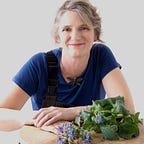(Sample) Blue Borage Email sent 30/4/23
Here’s an example of the promotional emails sent by Blue Borage
Want to stay tuned with upcoming events?
Here are two ways:
- Follow my Humanitix profile, and you’ll get an email notification each time I set up an event (you’ll often get three or four at a time)
Humanitix Profile - Get onto the (new) email list on the (new) platform that is host to new online courses, email software, and soon an online community.
Blue Borage Gentle Composting (new website)
…and here’s today’s email:
Hey there,
As we move into the cooler season, I am feeling ever so lucky to have found the perfect indoor teaching venue for edible gardening.
It’s the Whangarata Community Hall — if you follow me on Instagram, then you’ve probably seen it each week over the last month or so.
I love it!
Part of the appeal for me is the feeling like I’m stepping back in time, to a world that was far more simple. A time when everyone grew more food, dried their own herbs, made jams and pickles, and wrote letters by hand. When milk was only sold in glass bottles, and you knew your next door neighbour.
Spot the child of the 70s.
In terms of the physical space, I love the shiny wooden floors, the abundance of windows and light, and the ease of parking. And the fact that we get the whole building to ourselves, with a full kitchen.
I’ve taught in all sorts of venues over the last five years, and inwardly I shudder when I get led into a teaching space that’s carpeted… it’s like I can’t be myself unless a bit of soil gets spilled.
What’s different about this course?
The topics are simple and the objectives clear.
Week 1: Seeds
Week 2: Soil
Week 3: Plants
Week 4: Pests
Week 1:
Learn to make seed raising mix, and start off a few trays of seeds (these will be your babies for the duration of the course and beyond)
Learn how to save, store and share seeds. It’s really not as complicated as people make out, and I’d love to see you able to host your own seed swaps with confidence.
Week 2:
Learn about all the different ingredients that I use in my Blue Borage potting mix, from leaf mould to worm castings, biodynamic CPP to Agnihotra ash.
If your seeds from week 1 have popped up, then we transplant them, otherwise you go home knowing how to do it (after practising on my seedlings)
Week 3:
This is when we get really intentional about maximising the biodiversity in your garden. You’re likely to need a box to take home a stack of new plants, as I use this as a chance to fill my car with all the abundance that’s cluttering my garden beds at home.
Learn which plants are easiest to grow from cuttings, and which ones to divide at the roots.
Week 4:
Time to examine the common challenges of weeds and pests, and make a plan that includes peaceful strategies for your space.
We finish up with some observation exercises.
I’ll admit it, my intention is to give you the confidence to deal with all your weeds on-site, cancel any garden waste collections, start making compost, worm castings and leaf mould, and grow from seed, even if it’s super low key and just some random flower seeds scattered over your container gardens.
Here are some reflections from Gillian, who was part of the first round of this new course in April:
“not having man-made chemicals was appealing… knowing how to deal with the noxious plants is such good knowledge, to look at them in a completely different way and use them.”
“learning to be self-sufficient, even in an urban garden.”
“it’s all so intriguing, and not as hard as you think it’s going to be.”
“you (Katrina) make it so accessible and easy to understand. I have more peace of mind, to have little snippets of knowledge, to take care of myself if I have to.”
“a little window has opened into this way of working sustainably.”
“I really appreciate the knowledge you have to share.”
This new four week series will eventually become an online programme and a mobile pop-up workshop suitable for workplace gardening, but for now I’m still gathering up all the photos, downloads, checklists and simple instructional materials.
The booking links are here:
Full series (starting May 3rd)
Week 1: 3rd May (standalone)
Week 2: 10th May (standalone)
Weeks 3 & 4 standalone tickets will get published later depending on space.
For those who are within a 60–90 minute drive of Whangarata, I hope this appeals.
The next Blue Borage email (hopefully coming this week) will be my take on Organic Week — it could be a bit of an essay, as I have so much to say about the divide between the commercial organic (and biodynamic) sector and the non-commercial community space that has a bigger focus on universal food resilience, and perhaps a greater level of care for soil health.
There’s lots to unpack, and I’m so appreciative of my Hua Parakore colleagues who share my values of searching for the intersection between excellence in food production while also focusing on community wellbeing. We can (and should) tick ALL the boxes.
Happy growing,
Katrina
